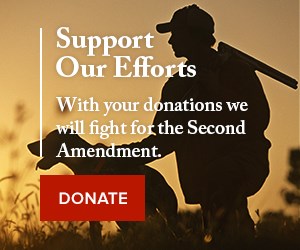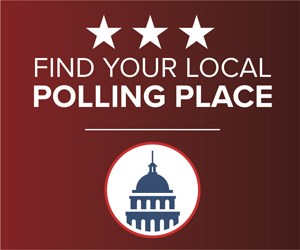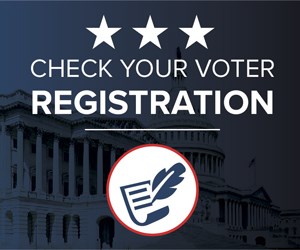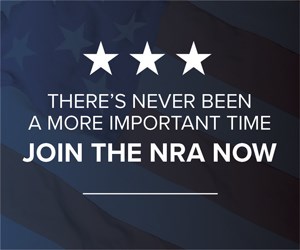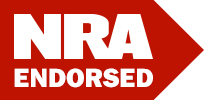
NRA's Wayne LaPierre and Chris Cox discuss with President
George W. Bush the Right to Keep and Bear Arms in America and the
importance of the 2004 elections.
NRA: In the early days of your
Administration, you had to engage a United Nations that actively
sought to import international gun controls to America. What can
you tell us about the response you sent the U.N.?
President Bush: In the United States we have a
long tradition of hunting and sport shooting. The Vice President
and I both love to hunt and fish. I understand that some countries
do not have that kind of tradition, but we objected to having the
United Nations try to impose international regulations that would
violate the Second Amendment and infringe on our sovereignty. My
Administration objected strongly.
NRA: Also early on in your Administration,
Attorney General John Ashcroft stated his view "that the text and
the original intent of the Second Amendment clearly protect the
right of individuals to keep and bear firearms." This was a clear
reversal, was it not, of the Clinton Administration's
position?
President Bush: It was a clear reversal. It was a
position that needed to be reversed-the prior Administration had
taken the position that the Second Amendment only applies to state
militias and doesn't protect an individual right to bear arms. My
opponent issued a press release earlier this year supporting that
exact same position. I know that's not what the Constitution says.
The Constitution gives people a personal right to bear arms. So we
did reverse the Clinton Administration's position, and I think that
was the right thing to do.
NRA: When you ran for Governor of Texas, you
promised to fight for a Right-to-Carry law. You fulfilled that
promise. Why did you think enacting the law was important?
President Bush: I signed the Right-to-Carry law
when I was Governor because I knew it would make Texas a safer
place, and it has. In fact, just this year I signed legislation
allowing law enforcement officers to carry concealed firearms as
they travel throughout the United States to better protect the
Nation from criminals.
NRA: As Governor you also launched "Texas Exile,"
a program that gave law enforcement the opportunity to strike hard
at armed, violent criminals by enforcing the toughest laws on the
books, federal or state. You brought the Exile concept to
Washington as Project Safe Neighborhoods. What can you tell us
about the progress of Project Safe Neighborhoods?
President Bush: We are making real progress. In
the past three years, Federal gun prosecutions have increased 68
percent. We have devoted over $1 billion to Project Safe
Neighborhoods, which is my strategy for bringing together Federal,
state, and local officials to fight gun-related crime. And I think
it proves what I've been saying all along, which is that the best
way to crack down on criminals who use guns is to vigorously
enforce existing gun laws. We did it, and it's working.
NRA: Both you and Vice President Cheney are
life-long hunters and fishermen. Has that fact helped guide your
Administration policy of expanding access to federal lands for
hunters and anglers?
President Bush: Yes. When I came into office, I
wanted Federal lands policy to take a different direction-that is,
I wanted balance, allowing responsible recreational activities
while conserving and protecting our natural resources. As a
life-long hunter and fisherman, I felt it was important to provide
sportsmen with access to federal lands and provide a strong
commitment to protect the lands they use.
Because I trust sportsmen-who, by the way, are the original conservationists-I expanded hunting and fishing access at more than 60 National Wildlife Refuges, and my Administration signed an agreement with 17 major sportsmen's organizations to improve hunting and fishing access to Federal lands. There are some who oppose these efforts-animal rights activists are currently challenging public hunting programs on 37 National Wildlife Refuges. I think this effort is misguided, so my Administration is opposing their lawsuit. Over 30 of our hunting and fishing conservation partners have voiced their opposition to this lawsuit on our behalf.
In addition to providing greater access, I have initiated
a conservation agenda. I signed the Healthy Forests Restoration Act
into law, which is reducing the risk of catastrophic wildfire in
national forests. Earlier this year I also announced a new national
goal to create, improve, and protect at least three million wetland
acres over the next five years. As part of that effort, I recently
announced a set-aside in the Conservation Reserve Program to help
protect 250,000 acres of grasslands, which are home to several
species of birds, including the northern bobwhite quail. By
expanding this program, we hope to see the quail population
increase by about 750,000 a year. USDA will offer early
re-enrollments and extensions for farmers whose contracts start
expiring in 2007, which is especially important in the Prairie
Pothole Region-an area that is vital to duck populations.
NRA: A top NRA priority this year was passing the
"Protection of Lawful Commerce in Arms Act," which had broad
bi-partisan support, because most Americans realize that attempting
to hold the American firearm industry responsible for the acts of
violent criminals is wrong. The Bush Administration strongly
supported this legislative remedy, but your opponent in this year's
election helped defeat the bill. Any comment?
 Dear Fellow NRA Member:
Four years ago, NRA Members went to the polls and stopped cold Al Gore's plans to continue the war on America's gun owners. Bill Clinton himself admitted that we made the difference in key states that swung the election for George W. Bush. The day the Bush-Cheney team arrived in Washington, the White House immediately ceased being-as it had been for eight years-central command for launching non-stop assaults on the Second Amendment. But now, four years later, we face a greater threat than even the Clinton-Gore Administration posed-the very real possibility of a Kerry-Edwards Administration. Make no mistake: John Kerry is the most anti-gun presidential nominee in our country's history, and his trial lawyer running mate isn't any better. The future of the nation is at stake November 2. Join with us-and ask your family, friends and fellow sportsmen to join with us-in voting for a freer and stronger America in voting to re-elect President George W. Bush and Vice President Dick Cheney. |
 |
 |
|
Wayne R. LaPierre
NRA Executive Vice President |
Chris W. Cox NRA-ILA Executive Director |
President Bush: I don't think it's right to
take the manufacturer or seller of a product that is legal and that
isn't defective and hold them liable just because the user
committed a crime or engaged in unlawful activity. If we start
holding entire industries responsible for the actions of criminals,
we risk Americans losing confidence in our laws, and we'll diminish
our basic constitutional liberties. Junk and frivolous lawsuits
like that are an abuse of the legal system. They kill jobs and hurt
the economy.
I strongly supported passage of the Protection of Lawful Commerce
in Arms Act because it would prevent frivolous lawsuits against gun
manufacturers and protected the thousands of workers that they
employ. I thought the legislation struck just the right balance-it
got rid of the frivolous lawsuits while carefully preserving the
right of every American to have their day in court if a product was
really defective or if a gun manufacturer or distributor really did
something that was wrong.
My opponent flew back from the campaign trail to Washington to
vote against that Act-one of the only two votes he cast all year
long. He has received more money from trial lawyers than any other
Senator in the last 15 years and, of course, he picked a trial
lawyer as his running mate.
NRA: Your opponent says he believes "in the right
to bear arms as it has been interpreted in our country." Why do you
think he finds it necessary to add that qualifier?
President Bush: My opponent believes that the
Second Amendment only protects the rights of state militias. I
think that makes the Second Amendment meaningless.
NRA: Exactly what principles will guide you in
your selection of nominees to the federal bench, including, of
course, the United States Supreme Court?
President Bush: I will appoint qualified men and
women to the Federal bench, men and women who will strictly
interpret the Constitution and not legislate from the bench. When I
make a nomination I take a close look at their qualifications and a
close look at their judicial philosophy. But I don't think it's
right to use litmus tests like my opponent would-it's just not
appropriate to ask a judge exactly how they would rule in future
cases. If you take a look at my nominees and the job they've done,
you'll see they have an excellent record of strictly interpreting
the Constitution and applying the law properly.
NRA: Mr. President, we deeply appreciate the
valuable time you have given us. Do you have any final words for
our members?
President Bush: I would just remind your members
that their votes matter. This is a historic moment in history.
We're helping to change the world for the better by spreading
freedom. It's hard work, but it's necessary work, and it's work
that will succeed, because I believe that freedom is the Almighty
God's gift to each man and woman in this world.
This young century is going to be liberty's century. By promoting
freedom at home and abroad, we're going to build a safer world, a
more hopeful America. By reforming our systems of government, more
Americans will be able to make their own choices and realize the
dreams that are available in this country. We'll continue to spread
ownership and opportunity to every part of our country. We'll pass
the values of our Nation on to a new generation, and we'll work for
peace and freedom. So the choice is clear. I need your members'
help, and I'm asking for their vote on November 2.








